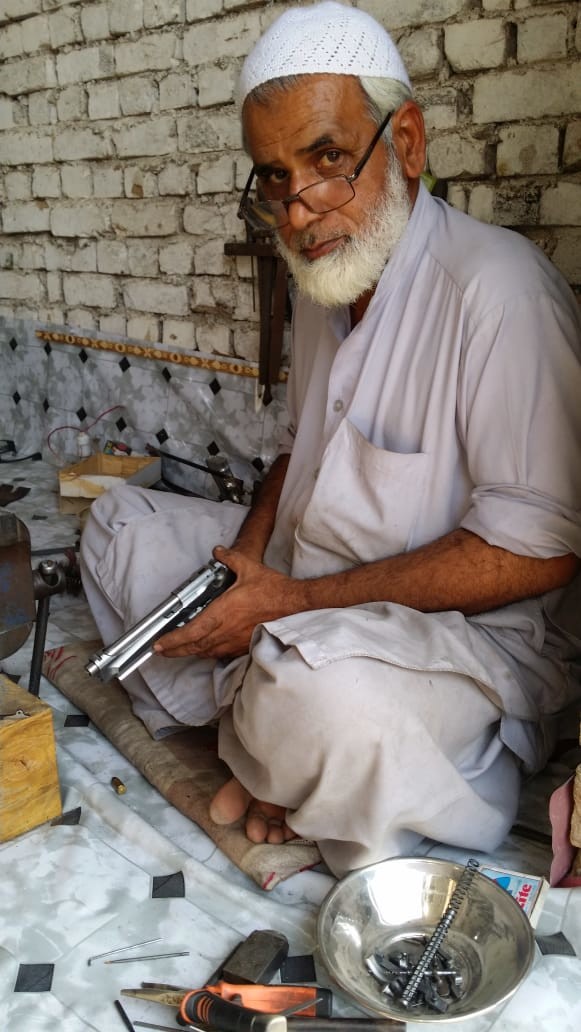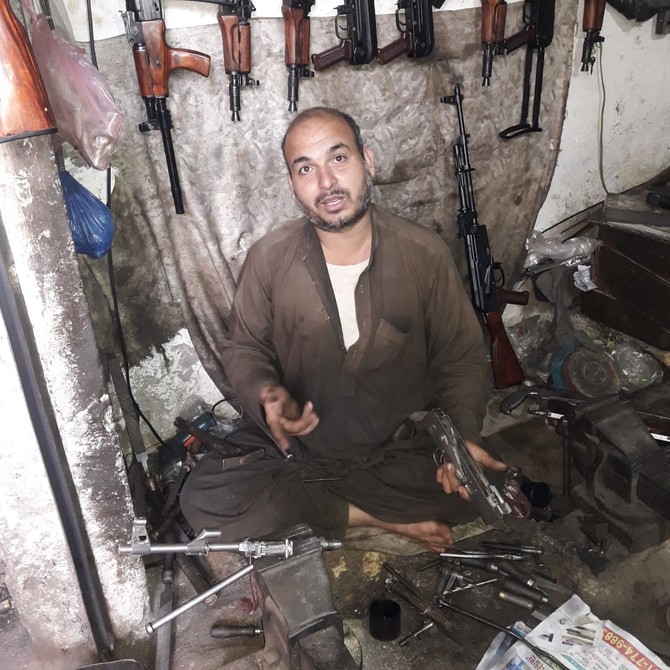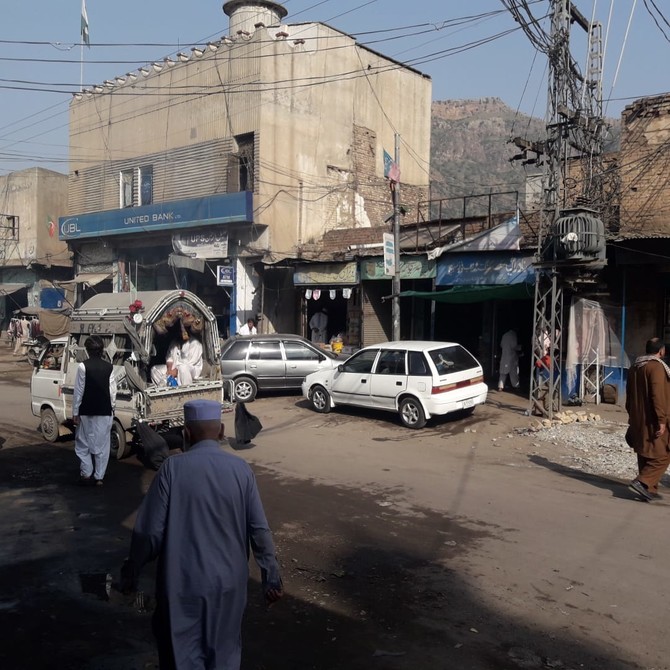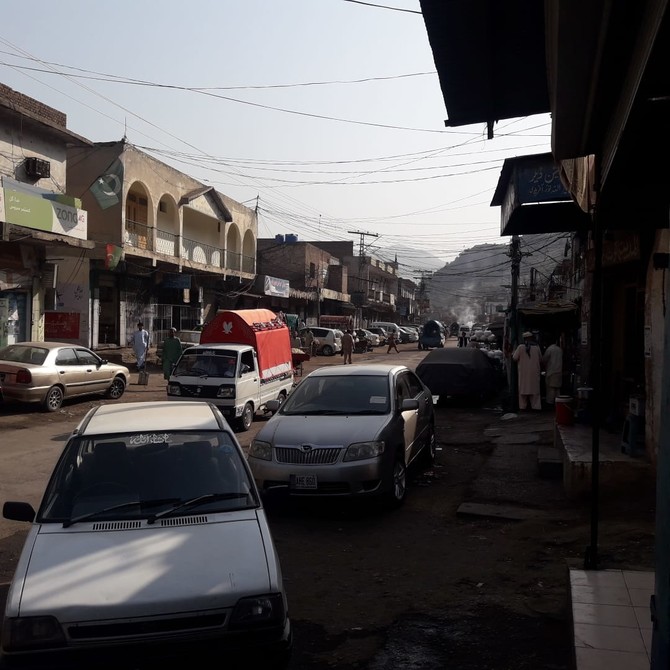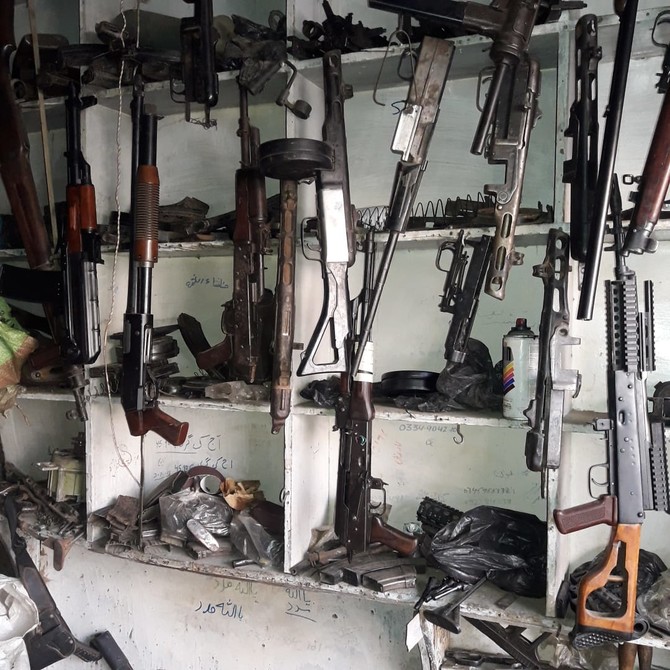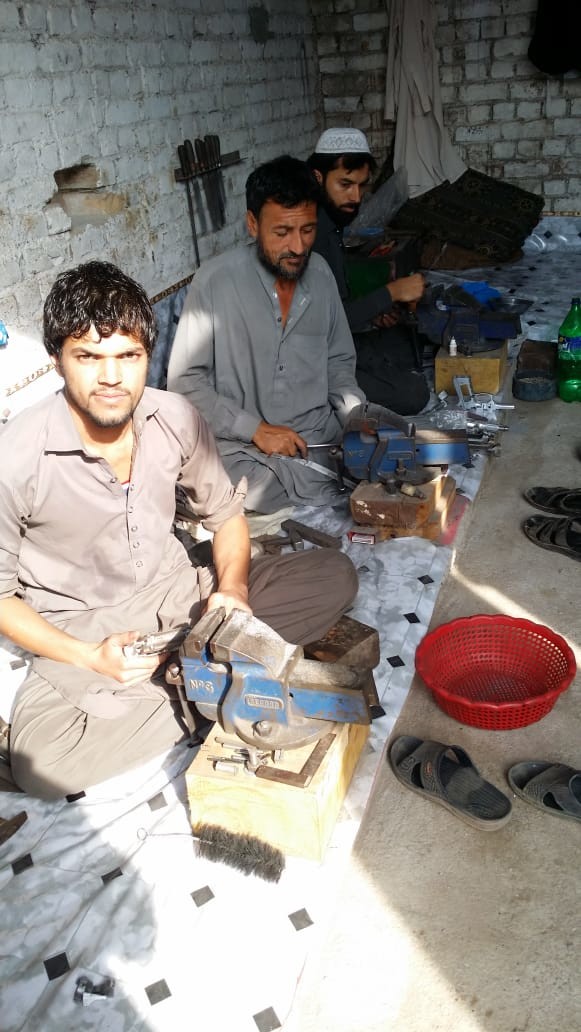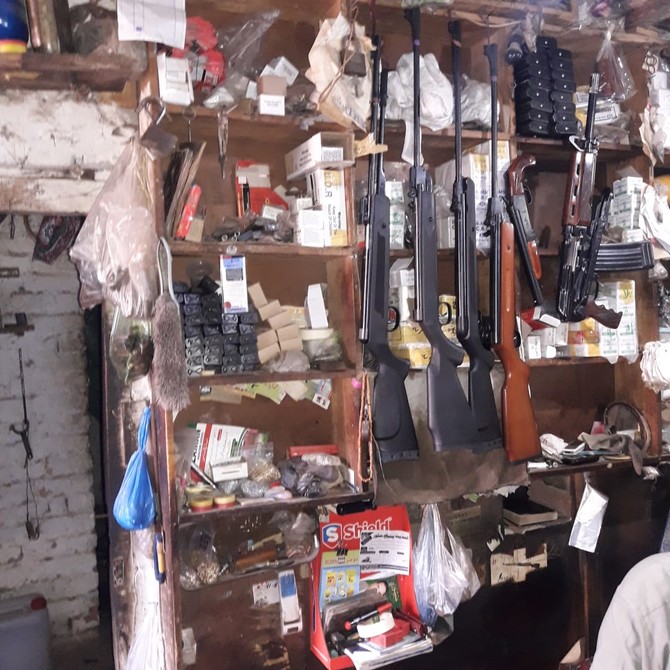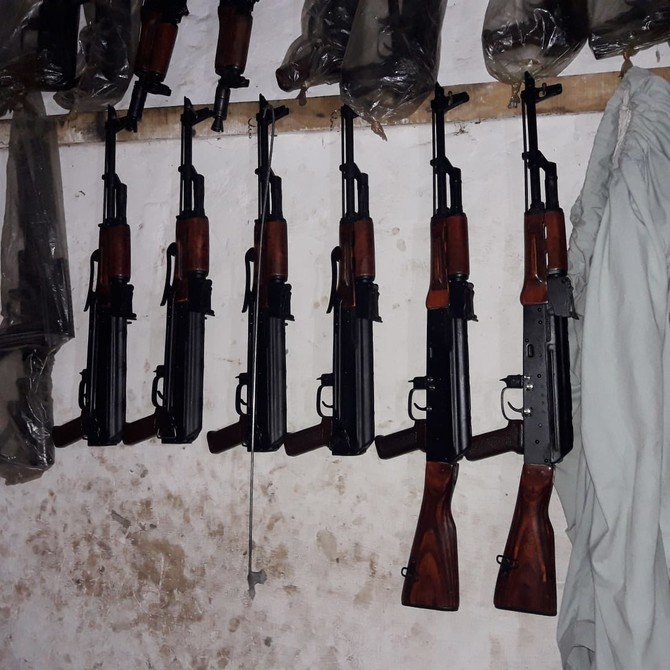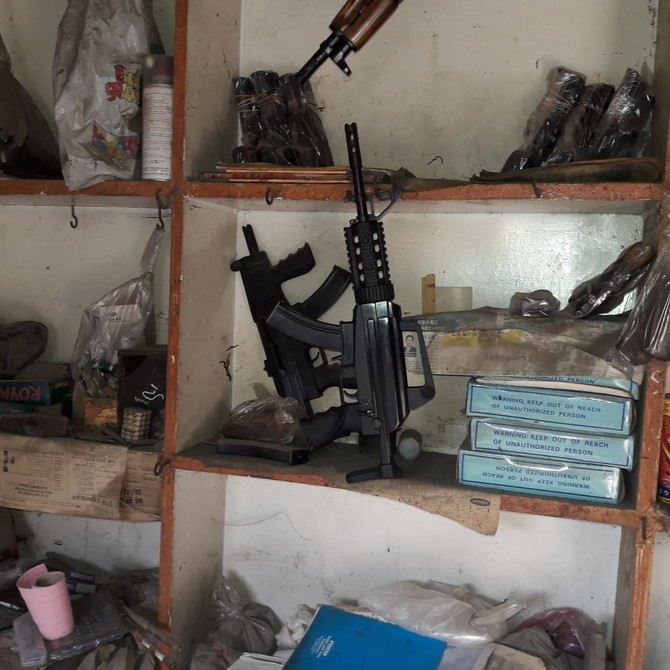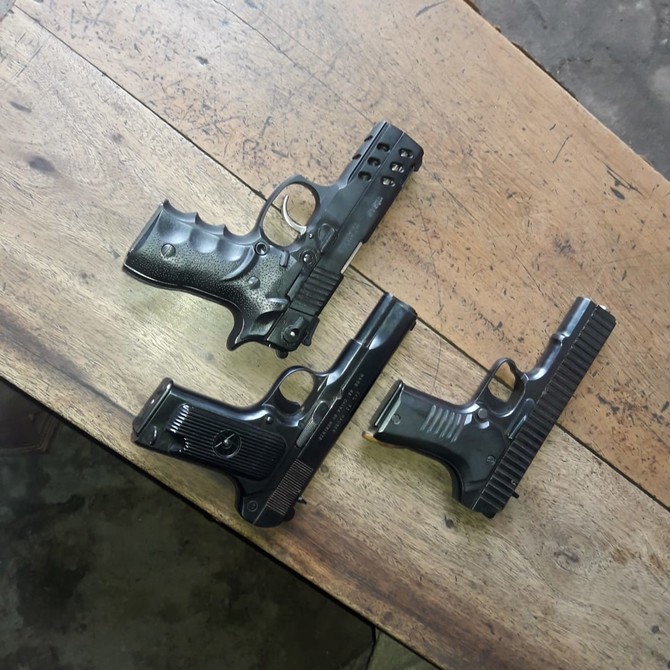DARA ADAM KHEL: It’s all guns and no roses for the shop owners of the weapons market that lines the bazaar in the dusty hamlet of Dara Adam Khel.
Inhabited by the Afridi tribe, the market has become the core identity of Dara Adam Khel — an area located between Kohat and Peshawar to the south of the Khyber Pakhtunkhwa province.
On any given day, it is packed with traders and merchants who have gained recognition for the quality and range of their guns and ammunition, with a number of tribesmen starting their businesses from scratch and soldiering on to become millionaires.
During an extensive range of interviews, where they spoke exclusively to Arab News, a majority shied away from taking credit for their craft, reasoning that they were only paying homage to skills passed on by their ancestors by taking the business forward.
Dating back to the pre-independence era of Pakistan, ancestors of these tribesmen — during their armed expedition in large swathes of Asia — learned the skills, passing it on to the future generations who developed it into a full-fledged arms industry in the Khyber tribal region.
Today, 40,000 to 50,000 residents of the area – with a total population of 110,000 — are directly associated with the industry, with every second owner saying that he inherited the business from his ancestors.
Quoting his great-grandfather, Kamran Afridi, a leading arms dealer from the area, said that members from the tribe used to form a Lashkar (armed resistance group) to fight the British imperial powers in parts of the Federally Administered Tribal Area, prior to 1947.
“There were times when tribal elders sent armed expeditions to parts of the sub-continent while the British forces used to come here to invade. Those types of armed clashes led them to learn ordnance and weapon-making skills, primarily from the Britishers. Then, our forefathers started replicating those skills when they would return from missions abroad,” Kamran said.
He added that while initially, it was a very tedious and slow-moving process to repair and manufacture small guns at their residential quarters or hujras; in time, his predecessors learned to develop their skills and eventually set up shops, hiring experienced and untrained laborers.
Later in the 50s, a few gunsmiths arrived from Punjab who were technically-trained in the craft and demonstrated comparatively-advanced methods of repairing and polishing second-hand weapons.
“Currently, according to my assessment, 6,000- 7,000 skilled laborers such as gunsmiths and professional manufacturers with technical expertise are involved in the arms hardware and ammunition-making process,” Kamran said, adding that, today, craftsmen from the market boast an incomparable expertise by being adept at assembling any type of weapon, on demand, with the help of a mere sketch.
The most popular items on sale include the 9-MM, 30-Bore guns, Repeaters, Kalashnikov and M-16 rifles. However, the industry prefers to manufacture non-prohibited weapons specifically for license holders, he said.
And while all the weapons are locally made, some hardware parts — such as springs and other items – are either sourced from Afghanistan or imported from western countries. However, according to Kamran, the biggest problem faced by the industry today is a questionable power supply and the government’s lack of commitment to regularize the market.
“The authorities never extend support to develop the industry. Rather, the recent military operations against militants in parts of the Khyber tribal district have dealt a severe blow to the business because of restrictions on the movement of people,” he said, suggesting that the government should instead introduce innovative measures to develop the market in the larger interest of the country.
“The weapons market can help bolster foreign exchange if the government helps improve its quality by introducing standard materials,” he added.
He reminisces a time, back in 2007, when former dictator Pervez Musharraf had approved Rs 50 million in funds to establish the Pakistan Hunting and Sporting Association, which was primarily aimed at modernizing the Dara Adam Khel weapons industry. That initiative, however, fizzled out due to political wrangling and bureaucratic red tape.
Last week, the federal government hinted at the possibility of allocating nearly 150 acres of land for the construction of an industrial zone catering to the weapons market, in the Mattani area of Peshawar, located near Dara Adam Khel. If the plans see the light of day, it would take two years to set up the infrastructure in the area.
Kamran said that the government has yet to kickstart the implementation process, even as the arms industry continues to irk residents of the area who complain of potential buyers randomly firing guns in the area due to the absence of a designated testing zone; and the lack of a proper sewerage system to drain chemicals and other wastes from the industry.
He added that while it will be a step in the right direction to designate an area specifically for the weapons industry, the move would also have far-reaching and negative consequences on small businesses.
That, however, does not seem to be a cause for concern for several gunsmiths who said that while they were working as unskilled laborers earlier, they have now gone on to become tycoons in the field.
One such rags-to-riches story is that of Muzaffar Khan Afridi who recalls a time in 1993 when he was working as a daily-wage gunsmith at arms and ammunition depot in Dara Adam Khel. “Today I have 30 gunsmiths working at my two ammunition stores,” he said.
Citing a lack of choice in terms of earning a livelihood in this impoverished part of the country, several said they had no other skills to teach their children and would be at the receiving end of the deal if small businesses were moved to the proposed industrial zone. “I have 17 members in my family and my business is the sole source of income,” Muzaffar said.
Samiullah Afridi, another weapons and ammunition dealer, thanked his great-grandfather for starting the family business from a hujra, which was eventually expanded to four stores in the market today. “According to a ballpark estimate, Dara Adam Khel has around 2,000- 3,000 arms depot and shops,” he added.
Throwing light on the intricacies involved in the arms-making process, Samiullah said that the metal and steel being used in the manufacturing of the weapons is recycled to improve its quality, standard and resistance power.
It’s a tedious process and involves days of hard work which begins by molding rigid steel — by tampering and designing it — to absorb massive and repeated shocks. The steel used by gun manufacturers in the US has an aluminum grading of 70-75, while the material used in Dara Adam Khel is for smaller guns and ranges between 40 to 45.
Highlighting the economic situation of the country, Samiullah said that while there continues to be a lack of employment opportunities across Pakistan, the weapons industry thrived dramatically due to an influx of educated youth who set up their own businesses in the market.
With the arrival of a more-informed generation of gun manufacturers who introduced innovative ideas, the industry was able to produce automatic rifles such as 9-MM, 30-Bore, 44, 223, 222, 32 and 12-Bore pistols, M-16, Kalakov, 7-MM, 8-MM, revolver, Makarov pistol and other brands of weapons.
He added that the government would no longer have to import small weapons if it allowed the import of small hardware items — such as steel and aluminum used in Brazil, Spain, USA, Turkey, and Russia – instead. This would help the industry produce locally-made weapons.
Secondly, the local weapons industry lacks a computerized system to check the standard, quality and resistance of steel. Despite all these deterrents, the most expensive gun manufactured locally is the M-16 also known as 223, which costs Rs 130,000.
Samiullah said that locally-made guns help small dealers – who operate from home — as all members of the family can assist each other, thereby saving their hard-earned money on rent, electricity and other amenities which otherwise they would have to spend toward the upkeep of a shop.
“We can produce excellent weapons to compete with the global market if the government regularizes the industry and offers incentives such as an uninterrupted power supply and legal cover,” Samiullah said.
Kamran concurs, adding that weapons manufactured in Dara Adam Khel are of a superior quality and can be exported to foreign countries only “if the government earnestly focuses on helping develop the industry.”
Dara Adam Khel’s weapons industry guns for greatness
Dara Adam Khel’s weapons industry guns for greatness

- Relocating market would have an adverse impact on small businesses, owners say
- Thriving manufactory took decades to develop and put Pakistan on the world map
Afghans married to Pakistanis fear split from families amid deportation drive

- Around 1.3 million Afghans, both undocumented and those with Afghan Citizen Cards, have left Pakistan since expulsion drive started in 2023
- Afghans married to Pakistanis have found themselves in a legal limbo and have had to leave families and lives behind after being deported
PESHAWAR: Muhammad Alam, 40, wakes up daily to the laughter and noise of his seven children as they begin their day at the family’s rented home in the northwestern Pakistani city of Peshawar while their mother prepares breakfast in a small kitchen.
These days, Alam’s heart is full of dread, and he is having frequent arguments with his wife over whether she and the children, six daughters and one son, will accompany him to Afghanistan if he has to leave.
Alam is an Afghan refugee who is married to a Pakistani woman. Under an ongoing repatriation drive targeting "illegal" foreigners that was launched by the Pakistan government in November 2023, Alam may have to leave the country soon. If that happens, he will be separated from his family, all of whom are Pakistani nationals and are refusing to accompany him.
Around 1.3 million Afghans have left Pakistan since the expulsion drive was started.
“We are in trouble because of the deportation drive,” Alam told Arab News at his home in Peshawar, the capital of the northwestern Khyber Pakhtunkhwa province.
“I can’t refuse to leave but who will convince my family? Just for me, these seven children will not go to Afghanistan and I can’t leave these seven behind.”
Alam holds a Proof of Registration (PoR) card, a document issued by the National Database and Registration Authority that provides temporary legal status and freedom of movement for registered Afghan refugees. It serves as an identification document, allowing Afghan refugees to legally reside in Pakistan. The PoR card was initially issued in 2007 and has been extended multiple times, currently valid until June 30, 2025.
Alam is unsure what will happen after that deadline passes next month: “If the government arrests and deports me, who will take care of my family?”
When he spoke to his children about going to Afghanistan with him, one of them replied: “You are an Afghan, you should go.”
Alam’s wife holds a Pakistani Computerized National Identity Card (CNIC) and his children all have the Form-B, an important document for children under 18 years old in Pakistan, serving as a child's identification document and necessary for various purposes like school admissions, passports, and international travel.
One of Alam’s daughters Laiba, 14, said the government should make a special case for her father as he had a Pakistani family.
“We and our mother have Pakistani identification documents, only he doesn’t have it. He should be given the [CNIC] card, the whole fight will end,” she said.
“What will we do in Afghanistan? We have neither seen nor gone there.”
Troubles have already begun for the family.
Laiba said she was refused enrollment in the 8th standard after she failed to present a Pakistani CNIC for her father.
“They asked for my mother’s [CNIC] card, I produced it. Then they asked for my father’s card. My father didn’t have a [CNIC] card, from where should I have produced it? So, they expelled me from the school,” the teenager said.
“Our school is gone already. What should we do?”
Qudratullah, 38, another Afghan refugee from Jalalabad who is married to a Pakistani women, is facing the same issue, saying his children and wife were refusing to accompany him to Afghanistan.
While he has an Afghan passport, his Pakistan visa had expired, after which he was deported to Afghanistan in October 2024. It took him nearly four months to get a new visa from Afghanistan and return to Pakistan in February this year, with a multiple-entry family visit visa that expires in February 2026.
“I have married a Pakistani woman but my wife doesn’t want to go with me to [Afghanistan],” Qudratullah told Arab News. “When I tell her to go, she starts fighting with me. She doesn’t want to go with me at any cost.”
Qudratullah's wife Nasreen Bibi described the situation as “too difficult.”
“Sometimes he [my husband] gets a visa and sometimes the visa is rejected, and he sometimes gets stuck there [in Afghanistan] and we are left alone,” she said at the couple’s home in Peshawar.
“We have children who are studying here, we have a house. We can’t go with him there, our children can’t live in that country.”
“HOSPITALITY”
Nauman Mohib Kakakhel, a Peshawar High Court advocate, has fought cases for families, where a Pakistani is married to an Afghan with Proof of Registration (POR) or Afghan Citizen Cards (ACC). The ACC is a document issued by the Pakistan government to undocumented Afghan nationals, allowing them to legally reside in Pakistan for a limited time and provides temporary protection from deportation.
“We filed a case for hundreds of families, and it was decided by the Peshawar High Court that since NADRA already has records of these families in the shape of Afghan Citizen Cards or Proof of Registration cards, as they enjoy refugees’ status in Pakistan and that’s a legal status,” Kakakhel said.
“And now they have got married to a Pakistani citizen, so this should be sufficient for them to get permanent residency in Pakistan.”
As per the law, children born to a couple where one partner is Pakistani and the other is Afghan, will automatically be entitled to the citizenship of Pakistan by descent when they turn 21, the lawyer explained.
After they turn 21, they must opt for the nationality of one country while Pakistani women married to an Afghan can hold the citizenship of both countries under Pakistani law.
Speaking to Arab News, Qaisar Afridi, a spokesperson for UNHCR in Pakistan, said Afghans, including human rights activists, journalists and others married to Pakistani nationals, were facing challenges in Pakistan:
“As the Pakistani government and the people of Pakistan have hosted Afghans for the past 40-45 years, we request the government of Pakistan that this hospitality should be continued until the situation in Afghanistan improves.”
Pakistan formally initiates talks with US on ‘reciprocal tariffs’ amid export concerns

- US imposed a 29% tariff on Pakistani goods as Islamabad pushes for export-led growth
- Pakistan says it sees the move as both a challenge and an opportunity to reset trade ties
KARACHI: Pakistan has formally begun negotiations with the United States over newly imposed “reciprocal tariffs,” an official statement said on Friday, with Finance Minister Muhammad Aurangzeb holding a conference call with US Trade Representative Ambassador Jamieson Greer to launch the process.
The talks come after US President Donald Trump imposed steep tariffs on a number of countries earlier this year, a move widely viewed as a setback for the global economy still recovering from the coronavirus pandemic. Defending the action, Trump said the tariffs were necessary to correct trade imbalances and counter what he described as unfair treatment of American goods abroad.
Pakistan was among the countries affected, with a 29 percent tariff placed on its goods at a time when Islamabad is pushing for export-driven growth.
Aurangzeb called the development both a challenge and an opportunity to reset trade ties in April, adding that a high-level delegation would soon travel to Washington to pursue the matter further.
“Pakistan’s formal negotiations on US reciprocal tariffs kick-started between Mr. Muhammad Aurangzeb, Pakistan’s Finance Minister and Ambassador Jamieson Greer, United States Trade Representative through a telephonic/conference call on 30th May, 2025,” the finance ministry said.
“The two sides exchanged their viewpoint through a constructive engagement with the understanding that technical level detailed discussions would follow in the coming few weeks,” it added.
The ministry said both sides expressed confidence in advancing the negotiations toward a successful conclusion at the earliest.
The US is Pakistan’s largest export destination, and the newly imposed duties threaten to undermine Islamabad’s fragile economic recovery.
According to Pakistan’s central bank, the country exported $5.44 billion worth of goods to the US in 2024. From July to February of the current fiscal year, exports to the US reached $4 billion, up 10 percent from the same period last year.
Nearly 90 percent of those exports are textiles, which analysts say will be hardest hit.
Experts have also warned previously the tariffs could reduce Pakistan’s competitiveness, especially if regional exporters such as China, Bangladesh and Vietnam redirect more goods to Europe, intensifying competition in alternative markets.
Pakistan plans virtual assets regulator as crypto council convenes next week

- Pakistan says it aims to shape a future-ready financial infrastructure while ensuring stability and compliance
- The country has announced this month to allocate 2,000 megawatts (MW) of electricity to power bitcoin mining
KARACHI: Pakistan plans to establish a regulatory body to oversee digital assets, with the proposal set to be discussed at a meeting of the Pakistan Crypto Council next week, the finance minister said on Friday.
The move marks a significant shift for the South Asian nation, which had previously banned cryptocurrency transactions in 2018, citing financial risks and lack of regulation.
The Pakistan Crypto Council, set up in March, was formed to guide policy on blockchain, digital currencies and attract crypto-related investment as the government reconsiders its approach to digital finance.
“The Pakistan Crypto Council will convene a high-level meeting on Monday, 2nd June 2025, to be chaired by Senator Muhammad Aurangzeb, Federal Minister for Finance and Revenue,” the ministry said in an official statement.
“Key items on the agenda include the development of a robust regulatory framework to govern digital and virtual assets in Pakistan, in alignment with global standards and technological advancements,” it continued. “A focal point of discussion will be the groundwork for the establishment of the Pakistan Virtual Assets Regulatory Authority (PVARA) — a proposed autonomous body to oversee the digital finance and crypto ecosystem in the country.”
Earlier this month, Pakistan announced the allocation of 2,000 megawatts (MW) of electricity in the first phase of a national initiative to power bitcoin mining and artificial intelligence (AI) data centers.
Additionally, Bilal Bin Saqib, CEO of the Pakistan Crypto Council, unveiled the country’s first government-led strategic bitcoin reserve at the Bitcoin 2025 conference in Las Vegas.
The upcoming council meeting aims to lay down the foundation for a secure, transparent and innovation-friendly regulatory environment.
The finance ministry said the upcoming meeting would reflect the government’s commitment to shaping a future-ready financial infrastructure while ensuring stability and compliance in the emerging digital economy.
Pakistan’s deputy PM says Islamabad to appoint envoy to Kabul, signaling thaw in ties

- Announcement comes days after trilateral talks in China where both countries agreed to upgrade relations
- It remains unclear who will be Pakistan’s new envoy to Afghanistan and when the appointment will take effect
ISLAMABAD: Pakistan’s Deputy Prime Minister Ishaq Dar said on Friday Islamabad would upgrade diplomatic relations with neighboring Afghanistan by appointing an ambassador in Kabul in a bid to deepen engagement between the two neighboring countries.
The move comes amid long-running tensions, with Pakistan repeatedly accusing the Afghan Taliban administration of “facilitating” cross-border attacks by militant groups such as Tehreek-e-Taliban Pakistan (TTP) and the Baloch Liberation Army (BLA).
Kabul has denied the allegations, insisting Pakistan’s security challenges are its internal issue. Relations have further deteriorated in recent years after Islamabad launched a nationwide deportation drive targeting undocumented foreigners, the majority of whom are Afghan nationals. Pakistani authorities also maintained that some of them were linked to a spate of militant attacks in the country including suicide bombings.
Despite the strains, both countries have sought to improve ties in recent months. Dar led a delegation to Kabul in April and later participated in trilateral talks involving Chinese and Afghan foreign ministers in Beijing earlier this month.
“Pakistan-Afghanistan relations are on [a] positive trajectory after my very productive visit to Kabul with Pakistan delegation on 19th April 2025,” he said in a post on social media platform X. “To maintain this momentum, I am pleased to announce the decision of the Government of Pakistan to upgrade the level of its Chargé d’Affaires in Kabul to the level of Ambassador.”
“I am confident this step would further contribute towards enhanced engagement, deepen Pak-Afghan cooperation in economic, security, CT [counterterrorism] & trade areas and promote further exchanges between two fraternal countries,” he added.
The announcement comes after the recent trilateral meeting in Beijing, where Chinese Foreign Minister Wang Yi said both Pakistan and Afghanistan had “clearly expressed” a willingness to elevate diplomatic ties, according to an official statement.
At the same meeting, the three countries also agreed to expand cooperation under China’s Belt and Road Initiative (BRI), including the extension of the China-Pakistan Economic Corridor (CPEC) to Afghanistan.
The BRI — China’s multi-trillion-dollar infrastructure plan — aims to build land and maritime trade routes linking Asia with Africa and Europe. CPEC, considered the flagship of the initiative, includes over $60 billion in Chinese investments in Pakistan’s energy, transport, and industrial sectors.
It remains unclear who will be Pakistan’s new envoy to Kabul or when the appointment will take effect.
Pakistan criminalizes child marriages in Islamabad despite opposition from Council of Islamic Ideology

- Under the new law, the minimum age for marriage is set at 18 for both men and women in the federal capital
- Prison terms of up to seven years have been introduced for those who facilitate or coerce children into early marriages
ISLAMABAD: Pakistani President Asif Ali Zardari on Friday signed into law a bill criminalizing child marriages in the federal capital of Islamabad, despite opposition from a constitutional body that advises the Pakistani government on the compatibility of laws with Islam.
The law criminalizes underage marriages and introduces strict penalties of up to seven years in prison for family members, clerics and marriage registrars who facilitate or coerce children into early marriages. Any sexual relations within a marriage involving a minor, regardless of consent, will be considered statutory rape, according to the law. An adult man who marries a girl under the legal age could face up to three years in prison.
Pakistan’s National Assembly had unanimously passed the Islamabad Capital Territory Child Marriage Restraint Bill tabled by Pakistan Peoples Party’s (PPP) Sharmila Faruqui on May 16. Under the new law, the minimum legal age for marriage for both men and women in Islamabad is 18. Previously, it was 16 for girls and 18 for boys.
However, the Council of Islamic Ideology this week declared the said bill “un-Islamic,” saying that clauses of the bill, such as fixing the age limit for marriage and declaring marriage below the age of 18 as child abuse and punishable, did not conform with Islamic injunctions.
“The Islamabad Capital Territory Child Marriage Restraint Bill, 2025 is assented to, as passed by the Parliament,” President Zardari was quoted as saying in a notification issued from his office.
In Pakistan, 29 percent of girls are married by the age of 18 and 4 percent marry before the age of 15, according to Girls Not Brides, a global coalition working to end child marriage. In comparison, five percent of boys marry before 18.
PPP Senator Sherry Rehman thanked the president for signing the bill into law “despite all pressure.”
“Proud moment for Pakistan,” she said on X. “Thank you to all the women and men who made this possible after a long journey of twists and turns.”
Pakistan ranks among the top 10 countries globally with the highest absolute number of women who were married or in a union before turning 18.
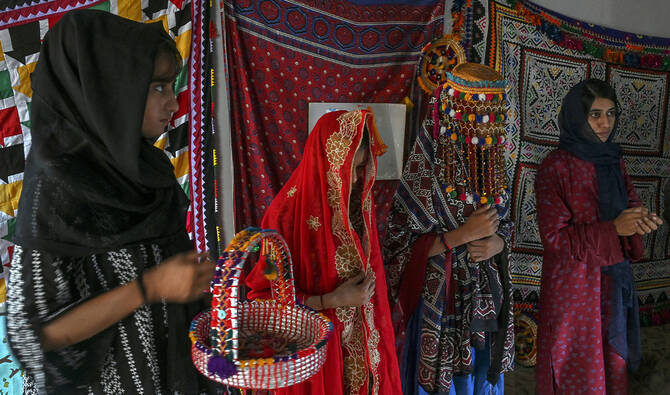
Girls who marry young are less likely to complete their education and are more vulnerable to domestic violence, abuse and serious health complications.
Pregnancy poses significantly higher risks for child brides, increasing the chances of obstetric fistulas, sexually transmitted infections and even maternal death. Teenagers are far more likely to die from childbirth-related complications than women in their twenties.


